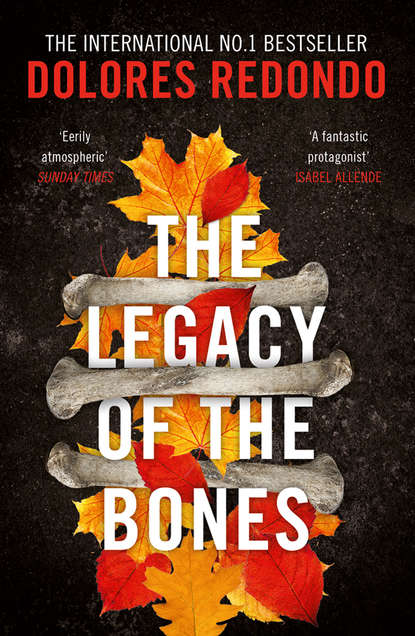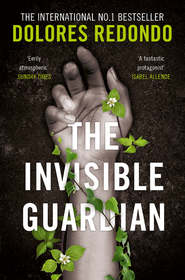По всем вопросам обращайтесь на: info@litportal.ru
(©) 2003-2025.
✖
The Legacy of the Bones
Автор
Год написания книги
2019
Настройки чтения
Размер шрифта
Высота строк
Поля
Amaia remained kneeling for a few seconds, puzzling over the body.
Jonan gazed expectantly at her.
‘Can we take it away now?’ one of the technicians asked.
‘Not yet,’ said Amaia, raising her hand without looking round. ‘Your honour,’ she called out.
Markina turned towards her and obediently made his way back.
‘Quiralte said that if he’d spoken to me sooner he wouldn’t have had to rot in jail for four months, didn’t he?’
‘Yes, he did, although having confessed to the crime, I’m not quite sure how he imagined that would happen.’
‘I think I do …’ she whispered, pensive.
Markina held out his hand, which she frowned at, rising to her feet and circling the grave.
‘Doctor, could you cut through more of the bag, please?’
‘Certainly.’
He went to work with the scissors again, this time opening the lower half of the bag down to the knees.
The skirt Lucía Aguirre had been wearing with her striped pullover appeared hitched up, and her underclothes were missing.
‘I assumed we would find evidence of sexual aggression – it’s common in cases like these. I wouldn’t be surprised if it occurred post-mortem,’ said the pathologist.
‘Yes, like a furious unleashing of all his fantasies – but that’s not what I’m looking for.’
Gingerly, she peeled away the bag on either side.
‘Jonan, come here a minute. Keep the plastic taut so the mud doesn’t get in.’
Jonan nodded and passed the camera to one of the technicians. He knelt down and clasped the two bits of plastic firmly in both hands.
Crouching beside him, Amaia fumbled for the victim’s right shoulder, slowly feeling her way down the arm, which was partially obscured by the body leaning slightly on to its side. Using both hands, she dug her fingers underneath the body at the level of the bicep, and pulled gently to reveal the arm.
Jonan gave a start, lost his balance and fell on to his backside, still clinging to the plastic sheet.
The arm appeared to have been severed from the elbow in a clean, neat incision; the absence of any blood made it easy to see the tip of the arm bone and the atrophied flesh surrounding it.
A terrible shiver coursed through Amaia’s whole body. For an instant all the cold in the universe converged on her backbone, making her judder as if she’d received an electric shock.
‘Chief …’ Jonan’s voice brought her back to reality.
She looked straight at him and he nodded.
‘Come on, Jonan,’ she ordered, tearing off her gloves and starting to run towards the car.
She stopped in her tracks, wheeling round to address Markina:
‘Your honour, call the prison and tell them to keep Quiralte under strict surveillance. If necessary, they should put a guard inside his cell.’
Markina was already clutching his mobile.
‘Why?’ he asked with a shrug.
‘Because he’s going to kill himself.’
She had let Jonan take the wheel – she always did when she needed to think and was in a hurry. He was a good driver, managing to achieve the right balance between safety and the impulse to put his foot down on the accelerator, which she would have yielded to. The journey from Azanza to Pamplona took them less than thirty minutes. In the end the rain had held off, but the overcast skies had led to a starless, moonless night that seemed to dampen even the city lights. As they turned into the prison car park, they saw an ambulance with its lights extinguished.
‘Shit,’ she whispered.
An officer was waiting for them at the door and ushered them into a corridor so they didn’t have to go through security. As they hurried along the passageway, he brought them up to date:
‘The paramedics and the prison doctor are with him now. He seems to have swallowed something, rat poison probably. A fellow inmate on cleaning duty must have sold it to him. They usually put it in each other’s food or cut drugs with it; in small doses it causes stomach cramps and nausea. When you gave the alert, he was already unconscious, lying in a pool of his own blood and vomit; I reckon he’s puked his guts out. He regained consciousness, but I don’t think he even knows where he is.’
Pale and worried-looking, the prison governor was waiting for them outside Quiralte’s cell.
‘We had no way of knowing …’
Amaia walked straight past him and peered into the cell. There was a pervading stench of faeces and vomit, and in the middle of it lay Quiralte, motionless on his bunk and with several tubes sticking out of him. Even with the oxygen mask on, she could see the severe blistering around his nose and mouth. One of the paramedics was taking notes, while the other quietly gathered up their equipment.
The prison doctor, who was an old acquaintance, wheeled around, removing his gloves before shaking Amaia’s hand.
‘Inspector Salazar, this was a tough one,’ he said arching his bushy eyebrows. ‘I got here first because I was still in the building. The paramedics arrived a few minutes later. We did our best, but we couldn’t save him. Ingesting this type of toxic substance seldom ends happily, still less when it’s self-administered.’ The doctor pointed to a discarded cyclist’s water bottle in the corner and continued: ‘As soon as he returned to his cell, he prepared the cocktail and drank it. He must have been in agony, but he didn’t make a sound or call for help.’ He contemplated the dead man once more. ‘One of the most horrific deaths I’ve ever encountered.’
‘Do you know if he left a letter or a note?’ Amaia asked, glancing about.
‘He left this,’ said the doctor, gesturing towards the bunk beds behind her.
She turned, stooping slightly to read what Quiralte had written on the wall of the lower bunk.
TARTTALO
Jonan did so too, wrinkling his nose.
‘He’s written it in …’
‘Faeces,’ confirmed the doctor, behind him. ‘Using it to write with is a common protest tradition in prisons. As for the word, I’ve no idea what it means.’
7 (#ulink_6b9fa37d-21ba-5381-a627-8c12542dd578)
Whenever Amaia called a meeting, she tried to make sure she’d be the first to arrive. She would remain for a few minutes staring through the windows looking out over Pamplona, collecting her thoughts, lulled by the growing murmur of voices behind her. Only Jonan would approach her, quietly, with a mug of coffee, which she always accepted, though it would often be left untouched after she had warmed her hands on it.
When she heard Inspector Iriarte’s voice cheerily greeting the assembled company, she turned to face the room. Accompanying him was Deputy Inspector Zabalza, who nodded and said something under his breath as he sat down next to Iriarte. She waited until they were all seated, and was about to begin talking when the door swung open and the Commissioner entered. He stood with his arms folded, leaning against the wall, offering his apologies before inviting her to carry on.
‘Pretend I’m not here,’ he said.











